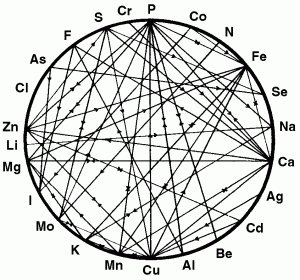The Science of Minerals
![]()
The following is from an interview with Dr. Paul Eck, the pioneer of Nutritional Balancing. It is taken from Issue #27-29 of the Healthview Newsletter, which was devoted entirely to this groundbreaking science.
The Chain Reaction Principle: Why just one mineral out of balance can affect all other minerals in the body
Every single mineral in the body has an effect on every other mineral in the body. So if just one mineral is imbalanced in the body, this affects all minerals by starting a massive chain reaction of mineral imbalances.
Most people say, “I’m just taking a little magnesium,” or a little zinc or whatever it is. If people only knew the harm they could cause by taking even one mineral supplement they didn’t need, or taking the right supplement in excessive quantities.

For instance, consider iron. Thousands of people take iron tablets because they are tired. Unfortunately, if iron is not taken in the right ratio with other minerals, it will make you more tired.
Everybody’s mineral chart is different and the amount of iron, and other minerals, which you need for more energy may be completely different than for the person next to you.
Here is what could happen to a person who takes an iron supplement:
- Sodium goes up. This is the first thing that happens. The iron will cause sodium levels to rise as a consequence of stimulating the adrenal glands.
- Magnesium goes down. Magnesium levels will go down because sodium lowers magnesium.
- Calcium goes down. When magnesium goes down, calcium also goes down to try to maintain the same calcium/magnesium ratio.
- Potassium goes up. Calcium and potassium also move in opposite directions. So when calcium goes down, potassium moves up.
- Nitrogen goes down. Since the person is going into fast oxidation, he is starting to cannibalise his own proteins, instead of building them. This lowers the nitrogen level.
- Copper goes down. Since tissue respiration is speeding up, copper is being used more quickly. If the copper is already at low levels, or, if the person has a high zinc to copper ratio, then his copper availability could plunge to dangerously low levels. At levels below 1.0, the person moves into a cancer danger zone.
- Zinc goes down. As copper goes down, zinc goes down to maintain the proper ratio with it. Since zinc is needed for proper functioning of the adrenal glands, the lowering of zinc will eventually exhaust the adrenals. This will make you more tired than before you started.
- Manganese goes up. As zinc goes down, the manganese goes up, since they normally move in opposite directions. Eventually, manganese reserves will become depleted.
As the manganese levels collapse, the person becomes weak and indecisive (exhausted adrenals) — weaker than he was before he began taking the iron tablets.
In other words, the taking of iron has
made the anaemia worse.
I could go on and on. All these mineral imbalances could easily be caused by just one mineral which has become too high in relation to the others — in this case, iron. You can see now what can happen when you take “just a little iron” to get your energy up.
So when a person has 21 minerals out of balance, just imagine how complicated it can get trying to balance them. Each mineral in the body has an effect on all the other minerals. No mineral works alone.
No matter what your views are on the “creation” of man, one thing is certain — the physical body of man is made up of minerals. Minerals are the basis of all life on this planet.
Every single physical living cell on earth is derived totally from minerals and mineral-based compounds. Every single living body cell. including the DNA genetic codes themselves are dependent upon minerals for both their structure and function.
Yet, without Hair Tissue Mineral Analysis, there is no scientific way of telling exactly which minerals and vitamins you need. Learn more…
© The Healthview Newsletter
